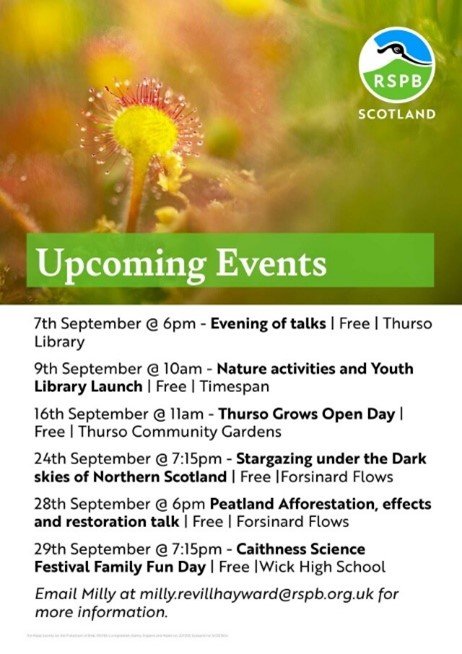Peatlands, Climate & the Flow Country
On Thursday 7th September, I attended the RSPB’s event on Peatlands, Climate and the Flow Country, as part of the Highlands & Islands Climate Festival. The talks were held in Thurso Library, and covered a wide range of subjects, centring around the RSPB’s hard work to protect Forsinard Flows Nature Reserve.
Photo Credit: RSPB
The event had a great turn out of people who were interested in the RSPB’s work, with a mixture of staff and volunteers holding the talks and sharing their experiences. We learned about the amazing size of the Flow Country, at 21 000 hectares! Therefore, the Forsinard Flows Nature Reserve is in the heart of one of Scotland’s most valuable environmental assets. The Flow Country holds over 10% of the UK’s blanket bog, and almost 5% of the world’s resource!
We learned that the peat can grow by up to 1mm a year and some areas of peat are up to 10m deep. The peatland, especially in areas of this size, is a perfect carbon trap or sink, and therefore an important defence against climate change. Peat is formed by partially decayed vegetation and moss which seals carbon into the ground so it doesn’t make its way into our atmosphere.
The Flow Country alone hold nearly 400 million tonnes of carbon! That’s more than double all of our countries woodlands combined! Pretty impressive really!
Peatlands and the Flow Country can only work like this if its looked after and cared for, which is what the RSPB are working so hard to do. They discussed the different measures they are using to look after the land such as damming, surveying, removing woodlands, and fixing areas that are over-drained. This provides homes for many birds, amphibians, invertebrates and plant species.
The risks of wild fires were also discussed. Remember all though signs and posters you see when you’re out walking? The ones that say no camp fires? Well they aren’t for decoration! When a fire reaches the peatlands it can be devastating to the environment, peat has a party trick and can hide a burning fire under it for months before it relights and this circle can continue for a long time in a dry spell. The RSPB team spoke about how climate change could increase the risk of this, and although wild fires in the UK aren’t always started by human intervention, more dry spells will increase this possibility.
Details of RSPB events in September and the Highlands & Islands Climate Festival
The night ended with a lovely presentation from one of the volunteers about everything he has done and learned while being with the RSPB. He shared lovely memories and some funny stories along with the skills that you can gain from volunteering such as, 4x4 driving, safeguarding, peatland management and gaining confidence for the future.
Overall, it was a lovely evening spent with a very passionate group of people and I learned so much in only a couple hours.
This event has certainly reinforced to me just how important the area we live in is and the RSPB’s vital role in maintaining it. The RSPB will be holding some more talks and activities throughout the Highlands & Islands Climate Festival around Caithness and Sutherland. They are even planning an exciting stargazing night out on the reserve! Check out our the Festival’s events page for more details, and hopefully see you at an event soon!


